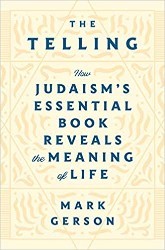Rabbi Dov Peretz Elkins, a Conservative rabbi who is the author of dozens of books, has assembled in his fictional Four Rabbis at Lunch a spectrum of rabbinic voices, not as data for a bird’s‑eye-view of communal trends, but rather as a fly-on-the-wall listening to what these rabbis might discuss in a series of private luncheons. Elkins is a National Jewish Book Award winner, and the author of New York Times Best-Seller Chicken Soup for the Jewish Soul.
The book is structured through the framework of eighteen lengthy lunchtime conversations between fictionalized versions of friends and colleagues Elkins has had over his half-a-century career in the rabbinate: one Orthodox, two Conservative, and one Reform rabbi. These discussions cover a diverse array of topics, including intermarriage, interfaith dialogue, conversion, rabbi-board feedback, college campus Hillels, feminism, abortion, the laws of proper speech, and much more. Throughout it all the conversation partners argue, support each other, joke around, request advice, and share learning resources — a few actual articles on topics ranging from Jewish law to Israeli politics appear, with permission from the authors, in the midst of the otherwise imagined discussions. For example, the rabbis discuss the positives and negatives of surveys judging their performance. One character remarks, “Frankly, while most of the people like me very much, there are always the few cranks who will find a few things to kvetch about, and nitpick. I’m not really in favor of it, but they may just go ahead with it anyway. What do you guys think about it?” To this another replies, “I think that surveys simply invite feedback which can often be more damaging than helpful. They help foster the impression of 1,000 bosses, or the folks who have the do-it-my-way attitude, and might open up a forum for complaints. That being said, surveys that are focused, and cover the entire range of congregational matters, not just the rabbi’s performance, might possibly be useful.”
While providing realistic depictions of privately discussed topics like the ethics of rabbinic performance reviews is interesting, and often purposefully humorous, the book can at times be eyebrow-raising. The issue of the permissibility of Masonic practices at Jewish funerals is discussed by the group in no fewer than three separate chapters, and the Orthodox rabbi, seemingly positioned as an expert in Jewish law, who at some points quotes whole passages from renowned Orthodox scholars Rabbi Joseph Soloveitchik and Rabbi Moshe Feinstein to answer theological and legal questions, nevertheless, in an early chapter, recounts touring a cathedral and inviting a priest for Passover seder, both of which would be in violation of conventional Orthodox practice. Nevertheless, the book does provide a wide window into the countless burdens, questions, and insights rabbis both bear and share with one another. And by doing so, it provides personal perspectives on the pressing issues being faced by the contemporary American Jewish community.
One hopes that groups of real-life community rabbis share in these types of meetings, and that their respective congregants can be enriched.
Dr. Stu Halpern is Senior Advisor to the Provost of Yeshiva University. He has edited or coedited 17 books, including Torah and Western Thought: Intellectual Portraits of Orthodoxy and Modernity and Books of the People: Revisiting Classic Works of Jewish Thought, and has lectured in synagogues, Hillels and adult Jewish educational settings across the U.S.





